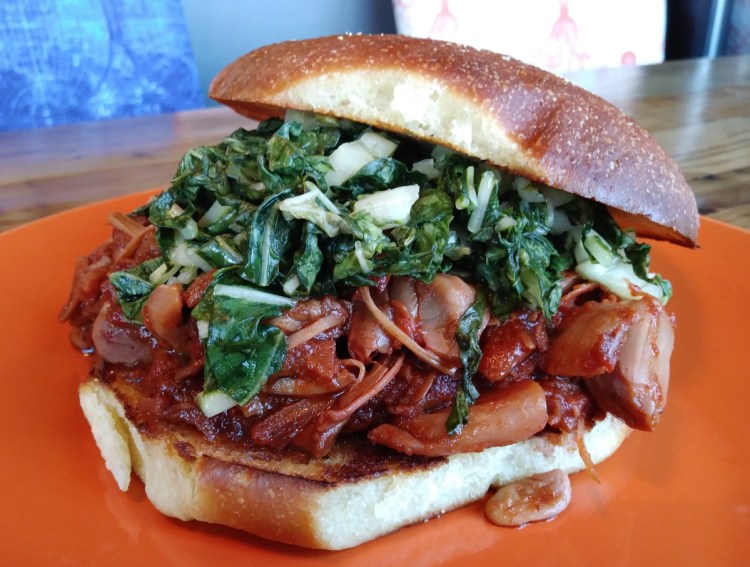When Wes Philbrick developed this summer’s menus for the Black Point Inn in Scarborough, the executive chef at the seasonal hotel sought to spice up the plant-based options on The Chart Room’s lunch menu.
“I wanted a vegan option that would be more exciting,” Philbrick told me. He did some research into vegan recipes and discovered jackfruit, which grows in tropical and sub-tropical climates.
“I went out and bought a whole jackfruit,” Philbrick said, “and the canned young, green jackfruit, and I played around with both.”
The result is pulled jackfruit tacos topped with apple braised cabbage, pineapple salsa and pickled red onion. Philbrick said sales started out slowly, with diners asking a lot of “what is jackfruit?” questions. But once people try it, he said, they like it and come back and order it again.
“We went from selling one or two on a busy lunch shift to selling eight to 10,” Philbrick said of the tacos filled with a fruit few Americans have ever heard of, let alone eaten.
But during during the past decade, vegans across the United States have embraced jackfruit, a relative of figs and mulberries whose individual fruits can weigh up to 100 pounds. Recipes for jackfruit proliferated in vegan cookbooks and blogs. The most popular ways to use jackfruit is as substitutes in barbecue and pulled pork style dishes, but it is also used to make vegan tuna salad, crab cakes, burgers, pot pies and grain bowls.
The rising American profile of jackfruit borrows from older food traditions. This year’s United Nations “Food Outlook” report devotes a special section to minor tropical fruits, including jackfruit. The report notes that jackfruit “is a widely known staple fruit in India and Bangladesh, where it is mostly prepared as a meat substitute.”
In Maine, the Black Point Inn isn’t the only local restaurant with jackfruit on its menu. The Fork & Spoon in Bangor, for one, has sold a barbecue jackfruit sandwich for years. “It’s a big seller for us,” said Fork & Spoon owner Elisabeth Dean. “People come here just for that.”
The Sinful Kitchen in Portland added barbecue jackfruit to its all-day brunch menu earlier this year. It can also be substituted for pulled pork in The Bomb sandwich, added to the non-vegan huevos rancheros or served as a side.
Customers are “really excited about it,” according to Denae Mallari, who owns the restaurant with her husband, chef David Mallari. “I encourage (customers) to try the jackfruit if they’re looking for something different. I have someone who comes in regularly and adds it to his tofu scramble.”
The 2018 “State of the Restaurant Industry Report” from market research firm Upserve recommends restaurants add jackfruit dishes. It reports sales data from thousands of restaurants across the United States reveals that jackfruit “saw a 131 percent growth in popularity in 2017.”
Jackie Hardin has seen this popularity first-hand. She co-owns Yeto’s in Biddeford with chef Bryan Casale, and roasted jackfruit has been on the menu since the restaurant opened in February.
“Depending on the week, sometimes the jackfruit items sell better than our other items,” Hardin said. “At least once a week someone says, ‘I want to try it because I’ve never had it before.’ A lot of vegetarians who’ve had it before will try it to see how ours is.”
Yeto’s kitchen staff starts with young, green jackfruit that comes in a vacuum-sealed package. It is drained, rubbed with a spice mix, then put in the smoker for about 20 minutes until it turns dark on the outside (or “barks up” in barbecue speak). Finally, cooks pull it apart to resemble pulled pork and cover it in barbecue sauce.

After draining, canned young, green jackfruit is easily pulled apart with two forks.
At the Sinful Kitchen, they take young jackfruit, cook it in butter, shred it and add barbecue sauce. When diners ask for a vegan version, the kitchen staff cooks the jackfruit with olive oil. Similarly, at Fork & Spoon the kitchen staff “shred it, add barbecue sauce, cook it down and that’s about it,” Dean said.
But the big question: Does it taste like pig flesh?
The Sinful Kitchen’s Mallari isn’t a vegetarian, but she eats jackfruit sandwiches often. “It resembles pulled pork, but it’s not exactly like pulled pork,” Mallari told me. “I had a customer ask me today: ‘Are you sure this isn’t pulled pork?’ ”
Chef Philbrick at the Black Point Inn agrees the similarities are strong. “When you break it down, it looks like pulled pork,” Philbrick said. “And then the mouthfeel is almost identical. The only difference is it doesn’t taste like pork.”
Which is either a good thing or a bad thing, depending on your point of view.
“All the vegans I’ve known in my life say they don’t want the meat, but they want the meaty feel,” and jackfruit offers it, Philbrick said. “Barbecue is the most approachable for anyone who is skeptical. It just works.”
Avery Yale Kamila is a food writer who lives in Portland. She can be reached at:
avery.kamila@gmail.com
Twitter:AveryYaleKamila
Send questions/comments to the editors.


